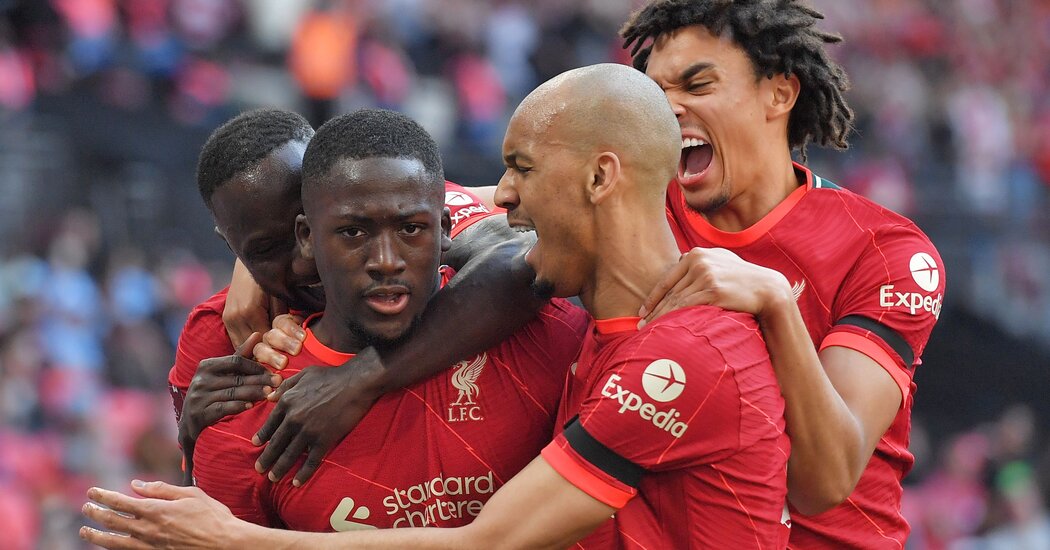
LONDON — In the single corner of Wembley bathed by bright sunshine, Kevin De Bruyne dutifully shuttled up and down. He stretched out his hamstrings and his calves. He made sure his ankles were nice and loose, and then, with great time and care, made sure his laces were tight. He wanted everything to feel just right when the call came.
It never did. With Manchester City trailing Liverpool by two goals, with its place in the F.A. Cup final and its aspirations of completing a domestic and European treble slipping from its grasp, City’s manager, Pep Guardiola, did not summon De Bruyne, his outstanding playmaker. The Belgian spent a few minutes in the sunshine, his gaze alternating between the game unfolding in front of him and Guardiola, and then returned to his seat in the shade.
Whether De Bruyne knew it or not, Guardiola had never considered anything else. He would, of course, have preferred to throw De Bruyne into the fray — or, indeed, to have him on the field from the start — but he felt, sincerely, that he could not.
De Bruyne had sustained a four-inch gash on his foot in City’s Champions League clash against Atlético Madrid on Wednesday. It had been stitched closed before he returned to England, and he had been prescribed a course of antibiotics to stave off an infection. It was starting to heal. Introducing him into a game three days later, though, would risk the reopening the wound. “Then we would lose him for more games,” Guardiola said. “At the end, I didn’t want to take that risk.”
It is hardly surprising that Guardiola was a little coy on why, exactly, De Bruyne was dispatched to the touchline to warm up, given that he evidently had no intention of allowing him into the game.
Perhaps it was a psychological ploy for the benefit of his teammates, a little boost as they sought to build on Jack Grealish’s second-half goal and reduce still further the three-goal lead Liverpool had established in a dominant first half. Or maybe it was a little ruse to unnerve Guardiola’s Liverpool counterpart, Jürgen Klopp, to force him to contemplate what he might do if De Bruyne, arguably the most creative player in English soccer, suddenly entered the fray.
Either way, the fact that De Bruyne was reduced to playing the role of an entirely theoretical threat encapsulated the greatest challenge these teams will face over the course of the next six weeks.
Both have been swept to the cusp of not just glory but some multiple of it — City hopeful, still, of winning both the Premier League and Champions League, Liverpool now in contention to complete a sweep of four available trophies — by the prowess of their players and the brilliance of their coaches, by virtue of being not only the most gifted teams, but the most intense, the most intelligent and the most industrious.
What unfolds between now and the end of the season, though, will hinge as much on endurance as ability. The line between absolute success and relative failure is as much a war of attrition as a battle of wits. What will define who wins the Premier League and, possibly, the Champions League is not which of them can soar highest, but which of them runs deepest.
That is particularly true for teams that find themselves competing on multiple fronts. Guardiola and Klopp both take great pains to stress that looking too far ahead can only lead to ruin, that allowing thoughts to drift to the hypothetical can only serve to distract from the concrete and the tangible.
But every lineup choice, for both, between now and the end of the season must now take into account not just the task at hand but the challenges to come.
Guardiola, at Wembley, named De Bruyne as a substitute despite knowing that he would not play. He was joined there by Ilkay Gundogan and Aymeric Laporte, both of whom were in the same boat, omitted from this game so that they would more likely be available for the next, against Brighton in the Premier League, or so that they did not reduce their chances of playing in the Champions League semifinal against Real Madrid in 10 days.
Strange as it seems to say it, for a team that has spent a decade or so building one of the two most expensive squads of all time — a team that includes the most expensive player in British history among its alternates — City’s list of available players is not particularly “long,” as Guardiola put it, these days.
“It is OK when everyone is fit,” he said. The subtext, of course, was that it is not when injury and fatigue set in. Though Guardiola prefers a concentrated, high-caliber squad, for a club of City’s long-term vision — not to mention its unrivaled resources — that is more than a little surprising; it is hard to imagine that the situation will not be amended in the summer transfer window.
Klopp took the opposite approach. Liverpool’s squad, bolstered by the arrival of Luis Díaz in January and somewhat untroubled by injury in recent months, is sufficiently well-equipped these days that he was able to offer some of his key figures a rest against Benfica in the Champions League last week — a privilege Guardiola, facing a pitched battle with Atlético Madrid, was denied — and still advance. That, in turn, allowed him to name a full-strength side on at Wembley on Saturday, a fact that likely proved the decisive factor.
The catch, of course, is that Mohamed Salah, Sadio Mané and the rest have only 72 hours before they face Manchester United in the Premier League, with a Merseyside derby against Everton lingering on the horizon beyond. Their legs will be just a little more weary for those games because of their exertions against City.
Klopp, in that sense, took just as much risk as Guardiola; sticking is no less of a gamble than twisting, after all. That is the position in which both coaches, and both teams, find themselves: weighing risk and reward, hoping they call it right, knowing that everything is on the line.




